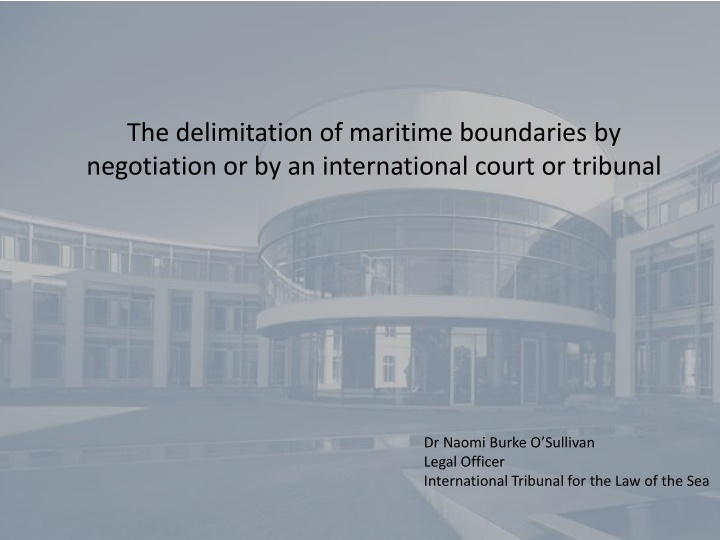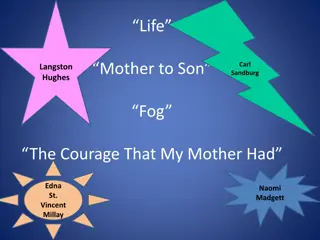Delimitation of Maritime Boundaries by Negotiation or International Courts
Delimitation of maritime boundaries can be achieved through negotiation or by international courts or tribunals. Maritime boundary agreements have legal effects and obligations for the involved states. International bodies like the International Court of Justice and the International Tribunal for the Law of the Sea play crucial roles in resolving disputes related to maritime boundaries.
Download Presentation

Please find below an Image/Link to download the presentation.
The content on the website is provided AS IS for your information and personal use only. It may not be sold, licensed, or shared on other websites without obtaining consent from the author.If you encounter any issues during the download, it is possible that the publisher has removed the file from their server.
You are allowed to download the files provided on this website for personal or commercial use, subject to the condition that they are used lawfully. All files are the property of their respective owners.
The content on the website is provided AS IS for your information and personal use only. It may not be sold, licensed, or shared on other websites without obtaining consent from the author.
E N D
Presentation Transcript
The delimitation of maritime boundaries by negotiation or by an international court or tribunal Dr Naomi Burke O Sullivan Legal Officer International Tribunal for the Law of the Sea
Legal effect of a maritime boundary agreement As a matter of international law, any international agreement is only binding on the parties to an agreement A bilateral boundary agreement cannot have a legal effect on the entitlements of a third State States that conclude a maritime boundary agreement have two separate obligations: 1. Registration Under Article 102 of the Charter of the United Nations every treaty and every international agreement entered into by a Member of the United Nations after the coming into force of the Charter must be registered with the Secretariat and published by it. No party to a treaty or an international agreement which has not been registered, may invoke that treaty or agreement before any organ of the United Nations. 2. Due publicity Requirement under UNCLOS to give due publicity to delimitation lines (articles 16, 75, and 84). The Division for Ocean Affairs and the Law of the Sea of the United Nations Secretariat has established procedures for receiving the deposits and dissemination of information received in order to assist States in complying with their due publicity obligations.
Delimitation of maritime boundaries by international courts and tribunals I. Permanent international bodies International Court of Justice (The Hague) International Tribunal for the Law of the Sea (Hamburg) II. Ad hoc international bodies, created to hear a specific dispute Arbitral tribunal created under Annex VII of UNCLOS composed of 5 arbitrators chosen by the parties. Parties are free to determine rules of procedure (timetable for proceedings, confidentiality, etc). Arbitral tribunal established under Annex VII of UNCLOS can only deal with law of the sea issues Ad hoc arbitral tribunal created by the parties For example, Slovenia and Croatia signed an arbitration agreement in November 2009 referring their land and maritime border dispute to arbitration. They created an arbitral panel of 5 members.
Delimitation of maritime boundaries by international courts and tribunals ICJ (The Hague) ITLOS (Hamburg) Created under the UN Charter Created under UNCLOS 15 Judges (with possibility of a smaller chamber) 21 Judges (with possibility of a smaller chamber) Can deal with disputes relating to all questions of international law, including territorial sovereignty Can only deal with law of the sea disputes Written proceedings typically take 3-4 years Written proceedings typically take 1.5 years Decision typically issued around 1 year after oral hearings Decision typically issued around 6 months after oral hearings
Obligations pending delimitation Articles 74(3) and 83(3) of UNCLOS Pending agreement as provided for in paragraph 1, the States concerned, in a spirit of understanding and cooperation, shall make every effort to enter into provisional arrangements of a practical nature and, during this transitional period, not to jeopardize or hamper the reaching of the final agreement. Such arrangements shall be without prejudice to the final delimitation. Practical arrangements may include: joint development agreements for hydrocarbons, joint fishing zones, moratoriums on activity Ghana/C te d Ivoire case before ITLOS pending the final delimitation, Ghana was ordered to ensure that no new drilling either by Ghana or under its control took place in the disputed area























